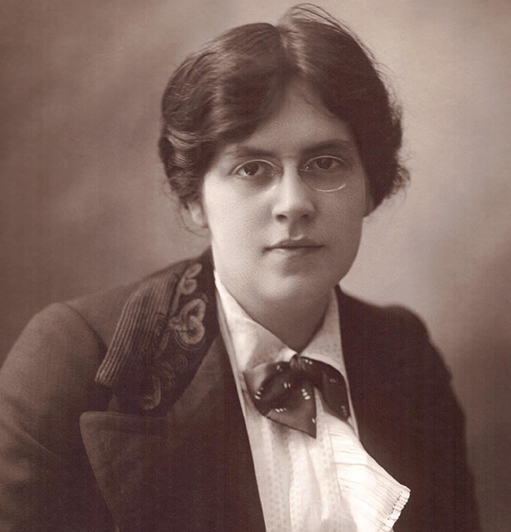Nadia Boulanger was one of the most renowned composition teachers of the twentieth century—or of any century. Her students are a who’s who of famous musicians, spanning seven decades: Virgil Thomson, Marion Bauer, Aaron Copland, Elliot Carter, Quincy Jones, Thea Musgrave, Philip Glass, and John Eliot Gardiner, to name only a handful. Her list of American students alone numbers 138.
Boulanger’s outsize impact as a teacher, however, has tended to obscure her accomplishments as a composer. She entered the Paris Conservatoire at the age of ten, studying alongside students many years older than her, and first came to public attention as a composer in 1908 when, in the first round of the famous Prix de Rome competition, she submitted an instrumental fugue rather than the required vocal fugue, much to the dismay of one of the examiners, Camille Saint-Saëns. The judges awarded her second place. Her sister Lili, who is the subject of another ASA post, fared better, winning the prize in 1913—the first woman to do so.
Nadia Boulanger composed a number of remarkable works, including around thirty songs, but she gave up composing in the early 1920s, partly due to the untimely death of her sister, whom she considered the better composer, and partly due to a lack of confidence in her own compositional abilities. Thereafter, she turned her attention toward teaching, and also promoting her sister’s music.
It is a shame that she didn’t write more, and that she looked down on her compositional efforts. (She once told Gabriel Fauré—who felt it was a mistake for her to stop composing—“If there is one thing of which I am certain, it is that I wrote useless music.”) As the three recordings below show, her songs are consummately crafted—lyrical, with long melodic arcs that create a kind of tensile strength; tonal but with colorful, quasi-impressionistic harmonies; and often bittersweet, with moments of tenderness tinged with pain.
Additional Resources
- Brooks, Jeanice, ed. Nadia Boulanger and Her World. University of Chicago Press, 2020.
- Boulanger, Nadia. Nadia Boulanger: Thoughts on Music, ed. and trans. Jeanice Brooks and Kimberly Francis. University of Rochester Press, 2020.
- Potter, Caroline. Nadia and Lili Boulanger. Ashgate, 2006.
- Robin, William. “She Was Music’s Greatest Teacher. And Much More.” New York Times, July 30, 2021.
- Clairières: Songs by Lili and Nadia Boulanger. Nicholas Phan, tenor, and Myra Huang, piano. Avie Records B081WVXQND, 2020, compact disc.
- Mademoiselle—Première Audience: Unknown Music of Nadia Boulanger. Nicole Cabell, soprano; Alek Shrader, tenor; Edwin Crossley-Mercer, baritone; Amit Peled, cello; François-Henri Houbart, organ; and Lucy Mauro, piano. Delos 3496, 2017, compact disc.



